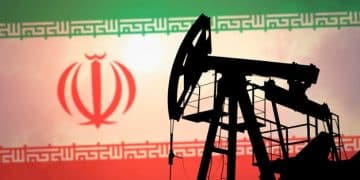US & North Korea: Denuclearization Options in 2025 & Beyond

In 2025, the US faces a complex challenge in North Korea’s denuclearization. Options include diplomacy, sanctions, military deterrence, and multilateral negotiations, each with distinct risks and potential outcomes.
The relationship between the US and North Korea has long been defined by tension, particularly surrounding North Korea’s nuclear ambitions. As we move into 2025, the question remains: what are the options for achieving the US and North Korea: What are the Options for Denuclearization in 2025? Given the history of failed negotiations and continued provocations, a fresh perspective is needed to explore potential pathways to denuclearization.
Understanding the Current Standoff
To assess the options for denuclearization in 2025, it’s crucial to understand the current state of affairs. North Korea’s nuclear program has continued to advance despite international sanctions and diplomatic efforts, making the situation increasingly precarious.
Several factors contribute to this continued standoff:
North Korea’s Perspective
North Korea views its nuclear arsenal as a deterrent against potential aggression from the US and its allies. The regime believes that nuclear weapons are essential for its survival and regime security.
Failed Negotiations
Past attempts at negotiation have largely failed due to disagreements over the sequencing of denuclearization steps and the lifting of sanctions. Both sides have been unwilling to make significant concessions.
International Sanctions
Although international sanctions have been imposed on North Korea, their effectiveness has been limited. North Korea has found ways to circumvent sanctions, often with the assistance of other countries.

Given these challenges, a comprehensive approach is needed to address the issue of denuclearization effectively. This requires considering a range of options and understanding their potential implications.
In conclusion, understanding the current state of US-North Korea relations is paramount. North Korea views its nuclear arsenal as essential for its survival, past negotiations have largely failed, and international sanctions have had limited effectiveness. Addressing these challenges requires a comprehensive approach, exploring various potential solutions and understanding their implications.
Diplomacy and Negotiation Strategies
One of the primary options for achieving denuclearization in 2025 is through diplomatic engagement. This involves direct negotiations between the US and North Korea, as well as multilateral talks involving other relevant countries.
Effective diplomacy requires careful planning and strategic execution.
Bilateral Talks
Direct talks between the US and North Korea can provide a platform for addressing key issues and building trust. However, these talks must be carefully structured to avoid repeating the failures of the past.
Multilateral Engagement
Involving other countries, such as South Korea, China, Japan, and Russia, can bring additional pressure and leverage to the negotiating table. A multilateral approach also allows for a broader range of perspectives and potential solutions.
- Conditional Engagement: Offering phased sanctions relief in exchange for verifiable steps towards denuclearization.
- Track 1.5 Diplomacy: Combining official government channels with informal discussions involving experts and academics.
- Confidence-Building Measures: Implementing measures to reduce military tensions and increase transparency.
Diplomacy and negotiation, although challenging, remain essential tools in the pursuit of denuclearization. Successful strategies require clear objectives, flexible tactics, and a willingness to engage in sustained dialogue.
In conclusion, diplomatic engagement is a central pillar in the pursuit of denuclearization with North Korea. Bilateral talks offer direct dialogue opportunities, while multilateral engagement brings broader support and diverse perspectives. Conditional engagement, track 1.5 diplomacy, and confidence-building measures are essential tactics. Effective diplomacy requires clear objectives, flexible approaches, and a commitment to sustained dialogue for achieving denuclearization.
Economic Sanctions and Incentives
Economic sanctions and incentives play a significant role in influencing North Korea’s behavior. Sanctions aim to pressure the regime to denuclearize by limiting its access to resources, while incentives offer potential rewards for compliance.
The effectiveness of these tools depends on their design and implementation.
Sanctions Enforcement
Strengthening the enforcement of existing sanctions is crucial to preventing North Korea from circumventing them. This requires greater cooperation from other countries and stricter monitoring of illicit activities.
Targeted Sanctions
Focusing sanctions on individuals and entities directly involved in North Korea’s nuclear program can minimize the impact on the civilian population while maximizing pressure on the regime.
Incentive Packages
Offering economic assistance, investment opportunities, and security guarantees can provide North Korea with a tangible incentive to denuclearize. However, these incentives must be carefully calibrated to ensure they are not exploited.
Economic sanctions and incentives can be powerful tools for influencing North Korea’s behavior. However, their effectiveness depends on careful design, strict enforcement, and a clear understanding of North Korea’s economic vulnerabilities.

In conclusion, economic sanctions and incentives are vital in influencing North Korea’s behavior. Strengthening sanctions enforcement and implementing targeted sanctions maximize pressure on the regime, while incentivizing compliance through economic assistance and security guarantees can offer tangible rewards. Effective use of these tools requires careful calibration, strict enforcement, and a deep understanding of North Korea’s economic landscape.
Military Deterrence and Security Alliances
Military deterrence and security alliances form another critical component of the strategy toward North Korea. These measures aim to discourage North Korea from using its nuclear weapons and to provide security assurances to US allies in the region.
Maintaining a strong deterrence posture requires ongoing vigilance and strategic planning.
US Military Presence
Maintaining a strong US military presence in South Korea and the surrounding region sends a clear message of deterrence to North Korea. This includes regular military exercises and the deployment of advanced military assets.
Strengthening Alliances
Enhancing security cooperation with South Korea and Japan is essential for maintaining a united front against North Korea. This includes joint military exercises, intelligence sharing, and coordinated diplomatic efforts.
Strategic Defense Systems
Deploying advanced missile defense systems, such as THAAD, can provide an additional layer of protection against potential North Korean missile attacks. However, these systems can also raise concerns about regional stability.
Military deterrence and security alliances are essential for managing the threat posed by North Korea’s nuclear program. A strong military presence, robust alliances, and advanced defense systems can help deter North Korea from using its weapons and provide security assurances to US allies.
In conclusion, military deterrence and security alliances hold a critical role in managing North Korea’s nuclear threat. A strong US military presence, enhanced alliances with South Korea and Japan, and advanced defense systems collectively deter North Korea from using its weapons and assure US allies. Vigilance, strategic planning, and ongoing cooperation are essential for regional stability and security.
Information Warfare and Internal Pressure
Information warfare and internal pressure represent unconventional yet potentially effective strategies for influencing North Korea. These approaches aim to undermine the regime’s control and create conditions for change from within.
These strategies require careful planning and execution to minimize risks and maximize impact.
Information Infiltration
Disseminating information about the outside world into North Korea can erode the regime’s propaganda and create a more informed populace. This can be done through various means, including radio broadcasts, smuggled media, and cyber operations.
Supporting Dissidents
Providing support to North Korean dissidents and defectors can help amplify their voices and create pressure on the regime. This includes financial assistance, advocacy support, and platforms for sharing their stories.
Cyber Operations
Conducting cyber operations to disrupt North Korea’s nuclear program and financial networks can undermine the regime’s capabilities and create instability. However, these operations must be carefully targeted to avoid unintended consequences.
Information warfare and internal pressure offer unique avenues for influencing North Korea’s behavior. By challenging the regime’s information control, supporting dissidents, and conducting targeted cyber operations, these strategies can create conditions for change from within.
In conclusion, information warfare and internal pressure are unique avenues to influence North Korea by challenging the regime’s information control, supporting dissidents, and conducting targeted cyber operations, these strategies can create change from within. Careful planning, risk minimization, and strategic execution are crucial for maximizing impact.
The Role of China and Regional Powers
China and other regional powers play a crucial role in shaping the dynamics of the Korean Peninsula. Their actions and policies can significantly influence North Korea’s behavior and the prospects for denuclearization.
Engaging these countries effectively is essential for a successful strategy.
China’s Influence
China is North Korea’s closest ally and largest trading partner, giving it significant leverage over the regime. Encouraging China to use its influence to pressure North Korea to denuclearize is a key element of any strategy.
South Korea’s Approach
South Korea’s approach to North Korea can also have a major impact. A policy of engagement and dialogue can help reduce tensions and create opportunities for cooperation, while a more confrontational approach can exacerbate the situation.
Japan’s Role
Japan has a strong interest in denuclearization due to its proximity to North Korea. Working with Japan on security cooperation, intelligence sharing, and diplomatic efforts can strengthen the overall strategy.
The actions and policies of China, South Korea, Japan, and Russia significantly influence North Korea’s behavior and denuclearization prospects. Engaging these regional powers is essential for a successful strategy.
In conclusion, China, South Korea, Japan, and Russia’s actions and policies significantly shape North Korea’s behavior and denuclearization prospects. Engaging these regional powers is essential. Encouraging China to use its influence, considering South Korea’s engagement approach, and collaborating with Japan are vital for increasing denuclearization prospects.
| Key Aspect | Brief Description |
|---|---|
| 🤝 Diplomacy | Negotiations for phased denuclearization |
| 💰 Sanctions | Economic pressure to limit nuclear funding |
| 🛡️ Deterrence | Military measures for regional security |
| 📢 Information | Influence via external information access |
Frequently Asked Questions
▼
Denuclearization refers to the process of North Korea dismantling its nuclear weapons program and adhering to international non-proliferation agreements. It includes verifiable elimination of nuclear weapons and facilities.
▼
Denuclearization is important because North Korea’s nuclear weapons pose a threat to regional stability and international security. It reduces the risk of nuclear conflict and proliferation in East Asia.
▼
China is North Korea’s primary economic partner and political ally, giving it significant influence. China’s cooperation is vital for enforcing sanctions and encouraging North Korea to negotiate denuclearization.
▼
Sanctions aim to pressure North Korea by limiting access to resources for its nuclear program. However, their effectiveness depends on strict enforcement and international cooperation to prevent circumvention.
▼
Military action carries severe risks, including potential for large-scale conflict, significant casualties, and regional instability. It should be considered only as a last resort option with careful evaluation.
Conclusion
In conclusion, addressing the challenge of North Korea’s nuclear program requires a multifaceted approach that combines diplomacy, sanctions, military deterrence, information strategies, and engagement with regional powers. No single solution is guaranteed to succeed, but a combination of these options offers the best chance of achieving denuclearization and ensuring regional stability in 2025 and beyond.





